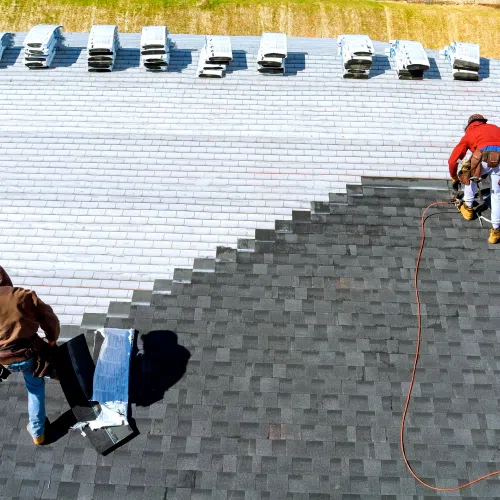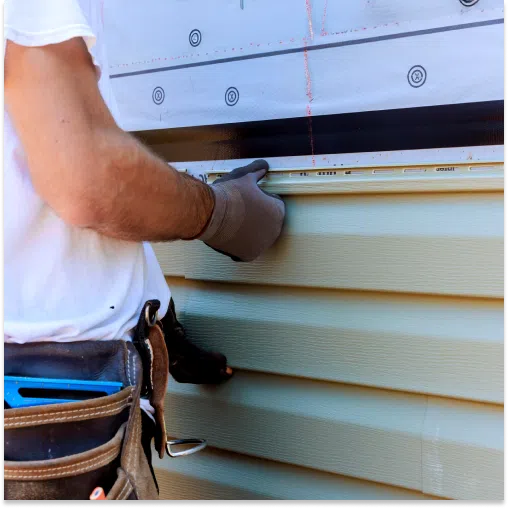Roofing sales and services play a crucial role in ensuring the longevity and safety of a home. Homeowners often need roofing solutions due to wear and tear, damage, or to enhance the aesthetic appeal of their homes. Unfortunately, many roofing contractors across the country struggle to develop a consistent, repeatable, and successful sales strategy that resonates with homeowners.
Therefore, let’s dive into the many stages of the roofing sales process. We’ll provide a step-by-step walkthrough of the entire process, from finding prospects to closing the deal.

Understanding the Importance of Roofing Services
Before diving into the sales process, it’s essential to understand why homeowners require roofing services. Whether it’s repairing leaks, replacing damaged shingles, or installing a completely new roof, these services contribute to the overall well-being and value of a property.
Exploring the importance of roofing sales sheds light on why homeowners frequently seek these solutions. Moreover, the key role sales play in providing a good experience for homeowners during the process.
- Structural Integrity: Regular maintenance and timely repairs can prevent issues such as leaks, water damage, and structural deterioration.
- Weather Protection: Roofs bear the brunt of weather conditions, including rain, snow, hail, and intense sunlight. Quality roofing materials and professional installation safeguard homes from weather-related damage.
- Energy Efficiency: A well-insulated and properly ventilated roof contributes to energy efficiency. Proper roofing services can address insulation issues, reduce energy consumption, and lower utility bills.
- Home Value and Curb Appeal: An aesthetically pleasing and well-maintained roof enhances the curb appeal of a home. This contributes to the homeowner’s pride and impacts the property’s market value.
- Preventing Interior Damage: Leaks and roof damage can lead to interior issues, such as water stains and mold growth.
- Long-Term Cost Savings: Proactive roofing maintenance and timely repairs can save homeowners from more extensive and costly issues down the line.
- Insurance Compliance: Many insurance policies require well-maintained roofs. Regular inspections and repairs ensure compliance and prevent coverage issues.
- Safety and Security: A secure roof provides protection against potential hazards and contributes to a secure living environment.
- Resilience Against Natural Disasters: In areas prone to natural disasters such as hurricanes, tornadoes, or wildfires, a durable roof is essential for the home’s resilience. Roofing services that focus on reinforcement and durability become invaluable in such regions.
- Environmental Sustainability: Certain roofing materials can reduce heat absorption, lower energy consumption, and support eco-friendly initiatives.
Homeowners want to make informed decisions about the care and maintenance of their roofs. For roofing contractors, providing a modern and professional sales process establishes trust and emphasizes the value of the services they provide. In general, this helps to foster lasting relationships with homeowners.

The Five Stages of Roofing Sales
The sales experience in the roofing industry has evolved greatly over the past few years. In fact, every step of the process has changed in one way or another.
Businesses are connecting with homeowners in new ways. And homeowners are doing their research to extensive lengths before ever reaching out to a business.
In addition, sales presentations have moved away from traditional methods such as paper materials and samples. The introduction of software into the industry has revolutionized the way sales reps interact with homeowners at the kitchen table.
Specifically, there are five key stages to roofing sales that are critical to winning or losing a job. For example, this includes:
- Finding prospects
- Qualifying the prospects
- Pitching your services
- Closing the deal
- Following up
Each step of the process leads to the next. However, you can make or break a deal if your team is less efficient in one area or another.
Let’s look closer at each stage of the sales process to gain a better understanding of the customer journey. This will help you recognize areas of improvement and the tools you need to close more deals.
1. Finding Prospects
The first stage of roofing sales involves identifying potential customers. This can be achieved through various methods, such as local advertising, online marketing, partnerships, referrals, and more.
By strategically positioning your services, you can attract homeowners in need of roofing solutions.
- Local Advertising and Marketing: Utilize local advertising channels to create awareness about your roofing services. It’s also important to Invest in online marketing strategies, including search engine optimization (SEO) to ensure visibility in local searches.
- Online Presence and Social Media: Establish a strong online presence with a user-friendly website that showcases your services, previous work, customer testimonials, and contact information. Leverage social media platforms to engage with the local community. Consider sharing roofing tips and showcase your expertise.
- Partnerships and Networking: Forge partnerships with local contractors, real estate agents, and other businesses to expand your network and receive referrals. Consider attending community events and joining local business associations to connect with potential customers.
You’ll find it hard to set up appointments if you aren’t proactive in your local community. This creates brand recognition and helps to build trust within your service area.
2. Qualifying the Prospects
Once prospects are identified, it’s important to qualify them based on their needs, budget, and timeline. This stage involves effective communication and active listening to understand the customer’s requirements. Furthermore, it ensures a tailored approach in the subsequent stages.
- Initial Contact and Needs Assessment: Develop a script for initial contact that allows sales representatives to introduce themselves and schedule a consultation. During the consultation, conduct a thorough needs assessment to understand the homeowner’s specific requirements, budget constraints, and timeline.
- Budget and Financial Qualification: Clearly communicate pricing structures and financing options to help homeowners understand the financial aspects of the project.
- Timeline and Urgency: Identify the homeowner’s timeline for the roofing project, addressing any urgency or time-sensitive concerns. Communicate the benefits of prompt action, emphasizing the importance of addressing roofing issues promptly to prevent further damage.
Qualifying prospects in roofing sales really comes down to a homeowner’s needs, their budget, and the timeline. Additionally, always make sure that you’re speaking with the individuals who have the authority to make the purchasing decisions for the roof. You don’t want to be talking to a renter who doesn’t own the property.
3. Pitching Your Roofing Services
After qualifying prospects, the next step is to present your roofing services persuasively in a modern and professional manner. Sales representatives should articulate the unique selling propositions of the company, emphasizing quality, reliability, and competitive pricing.
- Unique Selling Proposition (USP): Clearly define your company’s USP, highlighting what sets your roofing services apart from competitors. Craft a compelling pitch and presentation that communicates the value proposition clearly to potential customers.
- Visual Presentations and Testimonials: Create visually appealing presentations that showcase your services, materials, and past work. Share customer testimonials and case studies to build trust and credibility.
- Handling Objections and Concerns: Train sales representatives to anticipate common objections and provide techniques and persuasive responses. Address concerns such as project timeline, disruptions, and potential issues.
There are many effective strategies and communication techniques for roofing sales. But in general, it’s key that you focus on solutions once you identify the problems.
4. Closing the Deal
Closing a roofing job requires finesse and confidence. This includes the art of negotiation, handling objections, and creating a sense of urgency to encourage homeowners to make a decision. Emphasizing the benefits of your services and addressing concerns are pivotal in finalizing the deal.
- Negotiation Techniques: Provide training on effective negotiation techniques, emphasizing win-win scenarios. Create a sense of urgency by offering limited-time promotions or discounts for prompt decision-making.
- Proposal and Contract Presentation: Develop professional proposals that outline the entire project lifecycle. Present contracts in person, explaining terms and answering any questions to ensure understanding and satisfaction.
When it comes to roofing sales, the reps that close more deals always rise to the top. Therefore, it’s important to track sales performance to discover what works and what doesn’t. Implement continuous improvement throughout your team to prevent complacency.
5. Following Up
The relationship with the homeowner doesn’t end with the sale. Follow-up is important for customer satisfaction, referrals, and building a positive reputation. You can gain a lot from post-sale communication, addressing concerns, and seeking feedback.
- Post-Sale Communication: Regularly communicate with customers to provide updates on project progress. Address any post-installation concerns promptly, showcasing a commitment to customer satisfaction.
- Seeking Feedback and Reviews: Encourage customers to provide feedback and reviews on platforms such as your website, social media, or review sites. Use positive feedback to build your reputation and address any negative feedback proactively.
- Referral Programs: Implement referral programs to incentivize satisfied homeowners to refer friends, family, or colleagues. You can also reward customers for successful referrals to foster a sense of loyalty and ongoing engagement.
Many of the most successful roofing businesses utilize word of mouth and referrals to boost their sales. And the companies that don’t will most likely fall behind.
Training for Roofing Sales Representatives
You now know the key stages to roofing sales that are integral for business sustainability. But how can you find success within these stages if your team doesn’t have the proper training and guidance? Well, you can’t.
Continuous training and proper sales onboarding will be a difference maker that can lead to more success in the future. For example, make sure that your sales reps have extensive training that includes:
- Sales Strategies: Equipping sales representatives with effective sales strategies is everything. This includes understanding the psychology of buying, building rapport, and overcoming objections. The focus here is on practical techniques that resonate with homeowners.
- Brand, Products, and Services: In-depth knowledge of the brand, products, and services is essential for conveying confidence and credibility. Sales reps should be well-versed in the company’s offerings, allowing them to address needs and showcase the value of their services.
- The Insurance Process: Understanding the insurance process is vital, especially in cases of storm damage or unexpected roofing issues. Sales representatives should guide homeowners through the insurance claims process, providing a seamless experience.
- Building Estimates and Contracts: Accurate and transparent estimates are key to gaining a customer’s trust. You want reps that can produce estimates and contracts quickly with no errors and every necessary boxed checked.
You’re only as good as your team. And in this case, sales reps need to feel empowered and confident when they meet with potential customers.
Leveraging Software in Roofing Sales
In the digital age, software has revolutionized roofing sales. This includes quick estimate generation, professional presentation of services, task automation, digital contracts, and financing integrations – all within a centralized application.
With the right software, you can even manage every project from initial contact through the installation and project completion. And the best roofing CRMs offer integrations with industry leaders that include measurement tools, aerial imaging, financing, manufacturers, and more.
With Leap, you have access to the right-sized tools that can grow alongside your business. SalesPro is built to drive your in-home roofing sales forward and widen your margins. From quick estimates to digital contracts and task automation, SalesPro eliminates repetitive tasks and streamlines your processes to empower your sales reps and focus on winning the job. It also works directly with Leap CRM and other software solutions.
Leap CRM, on the other hand, is a must-have platform that includes project management, instant proposals, subcontractor management, and customer relationship management. From the office to the field, Leap CRM gives you access to every job on the go.
Turn Your Strategy into More Sales
Mastering the sales process requires a holistic approach, from understanding the homeowner’s needs to leveraging technology for efficiency. By following the five stages outlined in this guide, roofing contractors can improve their sales processes and build a better experience for homeowners.
As new technology has transformed the industry, you don’t want to be left behind. To gain a competitive edge, it’s important to build a tech stack that does the heavy lifting for your business so that you can make the most of your craftmanship.
So, are you ready to make your roofing sales your greatest strength? If so, fill out the form below and schedule a quick demo with a Leap expert. Learn more about the point-of-sale software and CRM solution that was built by contractors for contractors.




